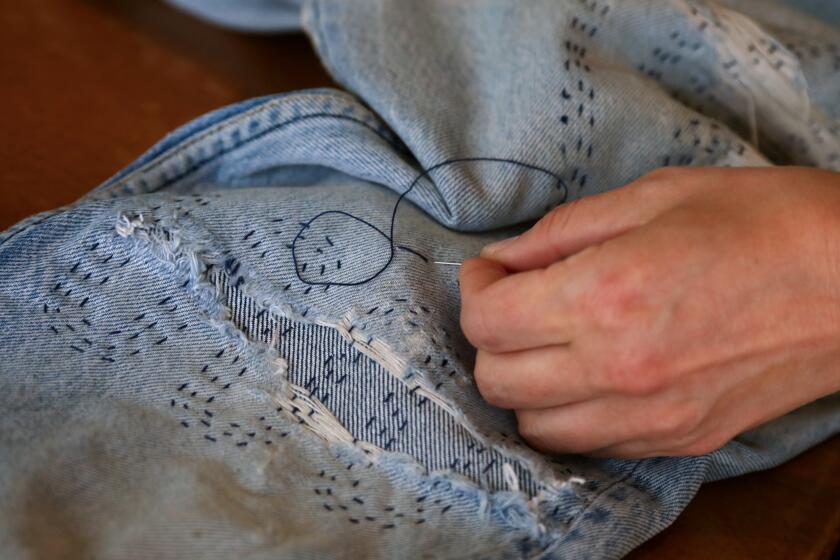Mattel gets control of Bratz dolls
A federal judge delivered a potentially fatal blow to the popular Bratz dolls and their manufacturer, MGA Entertainment Inc., ruling late Wednesday that archrival Mattel Inc. is the legal owner of the edgy toy line and has the right to recall all unsold Bratz.
The court order, which represents a major victory for toy giant Mattel, says MGA may no longer manufacture, sell, advertise or license its core lineup of Bratz dolls or any other product with the Bratz name.
Preteen girls, who took to the pouty-lipped Bratz almost from the time they debuted in 2001, will still be able to put them on their gift lists for this holiday season, however. The order by Judge Stephen Larson will not take effect until the warring toy companies meet in court Feb. 11, at the earliest.
Mattel Chief Executive Robert Eckert issued a statement Wednesday saying the company was pleased that the court “ordered MGA to stop selling Bratz products.” The brief statement also said the ruling “underscores what Mattel has said all along -- that MGA should not be allowed to profit from its wrongdoing.”
Issac Larian, chief executive and majority owner of MGA, said the company would appeal.
“I was just shocked” by the decision, Larian said. “It was unbelievable, but we will come out on top in the end.”
Asked whether the decision, if upheld, could mark the end of his company, Larian said, “I don’t want to even think about that right now.”
The decision covered nearly all MGA products issued under the Bratz name. But MGA would have to use another moniker if it were to keep making them.
Van Nuys-based MGA employs more than 1,500 people. Other than Bratz, the company’s products include a line of dolls called Rescue Pets.
If the order puts MGA out of business, Mattel would be rid of its primary fashion doll rival. The Bratz were seen as grabbing more and more sales from Mattel’s signature Barbie line.
The court order stemmed from a July decision by a jury that found the Bratz creator was working at Mattel under an exclusive contract when he came up with the idea for the doll line.
The federal jury in Larson’s Riverside courtroom awarded Mattel as much as $100 million for copyright infringement and breach of contract. It also granted Mattel the rights to key early drawings and a mock-up that designer Carter Bryant produced at Mattel before he went over to MGA.
The family-owned company based its toy empire on Bratz. Larson said in the decision that he took this into consideration.
“Factually, the hardship on MGA weighs very heavily upon the court,” Larson wrote. But he said that the court, “in the final analysis, must afford this very little, if any, weight.”
And although Larson wrote further that there was “a strong economic interest” in keeping a profitable company healthy during difficult economic times, “there is also a strong public interest in enforcing copyright laws.”
The legal battle over the Bratz has raged for more than four years. Larian said last month that MGA spent about $80 million in legal fees trying to protect his product.
He blamed the heavy legal expenses for his laying off 70 workers, about 4% of the workforce, in October.
Mattel has never said how much the entire legal battle has cost, but the company disclosed that in the first nine months of this year it spent nearly $30 million in lawyer fees and other costs.
Mattel, which is the world’s largest toy company, has had its own economic troubles of late. In November it eliminated 1,000 jobs, or about 3% of its worldwide workforce. About 170 of those cut jobs were at headquarters in El Segundo.
Barbie, created in 1959, reigned as the fashion doll queen for decades. But the Bratz, which have large, heavily made-up eyes and a far more sassy expression than sedate Barbie, were loved by preteen girls nearly from the moment they were introduced.
Creator Bryant, who reached a sealed agreement with Mattel before the trial began, said he got the idea for the look of the doll from observing teenagers near a high school.
Some parents object to the look of the Bratz, which wear hip-hugging clothes, often with bare midriffs. On the Web, the dolls were nicknamed Slutz.
Mattel did not say in the wake of the ruling whether it planned to take over the manufacture and sale of Bratz now that it has the name. In court filings, company executives asked for permission to destroy the dolls but could always change their minds.
Even though it currently does not make anything as racy as the Bratz, Mattel could use a hit in the fashion doll line.
In the third quarter this year, Barbie sales slipped 1% worldwide compared with the same period in 2007. But that was good news compared with the previous quarter, which saw a 21% drop.
--
More to Read
The biggest entertainment stories
Get our big stories about Hollywood, film, television, music, arts, culture and more right in your inbox as soon as they publish.
You may occasionally receive promotional content from the Los Angeles Times.







